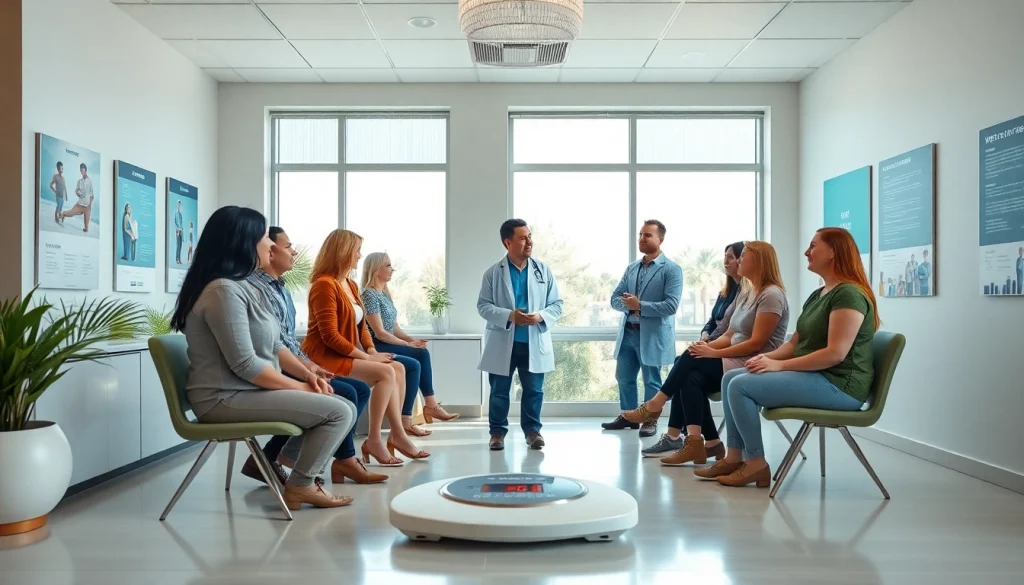Understanding the Importance of Choosing a Weight Loss Clinic Las Vegas NV
When embarking on the journey to lose weight, finding a reputable weight loss clinic las vegas nv can significantly impact your results. With numerous options available, knowing how to choose the right facility will help set the foundation for your weight loss goals. Medical supervision in weight loss management ensures that your weight loss journey is safe, effective, and catered to your individual needs.
Benefits of Medical Supervision in Weight Loss
One of the primary advantages of participating in a medically supervised weight loss program is the holistic approach to health that these clinics provide. Medical professionals can assess individual health conditions, which is vital for creating a tailored weight loss plan. This is particularly important for individuals with pre-existing medical conditions, such as diabetes or heart disease.
Moreover, a weight loss clinic can provide ongoing support and adjustments to your program as needed. Regular consultations allow for monitoring your progress and modifying diets or exercise routines based on real-time data. This responsiveness is crucial for tackling plateaus in weight loss, ensuring continuous motivation and results.
Key Features to Look for in a Weight Loss Clinic Las Vegas NV
Choosing the right clinic requires evaluating several key features:
- Qualified Staff: Ensure that the clinic has board-certified physicians and trained health professionals who specialize in weight management.
- Personalized Programs: Look for clinics that create individualized weight loss plans that address your unique health needs and goals.
- Evidence-Based Approaches: The best clinics utilize clinically-proven methods backed by research, such as behavioral therapy, and nutritional counseling, alongside medical interventions when necessary.
- Support Services: Consider clinics that provide emotional and psychological support through counseling or support groups, as mental health plays a critical role in the weight loss process.
- Accessible Resources: A good clinic should offer resources like educational materials, exercise programs, and access to dietitians or nutritionists.
Common Myths About Weight Loss Clinics
There are many misconceptions surrounding weight loss clinics, and debunking these myths can help individuals make informed decisions:
- Myth 1: Only Diet Pills Are Used: While some clinics may employ prescription medications when necessary, many focus on holistic and sustainable lifestyle changes, including nutrition and exercise.
- Myth 2: It Is Only for Severely Obese Individuals: Weight loss clinics cater to all individuals wanting to lose weight, regardless of their BMI, and can support small, achievable goals.
- Myth 3: Weight Loss Is Instantaneous: Effective weight management should prioritize gradual and sustained weight loss rather than quick fixes, as these are often unsustainable.
Medical Approaches Tailored to Your Needs
Overview of Medical Weight Loss Programs
Medical weight loss programs typically involve a comprehensive approach that incorporates medical, nutritional, and psychological methodologies. They often begin with an in-depth consultation where health history, current lifestyle, and personal goals are discussed. Based on this assessment, a weight loss strategy is formulated.
Programs may include dietary plans, exercise regimens, behavioral therapy, and, if necessary, medications that aid in reducing appetite or improving metabolism. This combination of techniques provides a powerful framework for achieving lasting results.
Personalized Plans: Diet, Exercise, and Support
Every individual’s body responds differently to diet and exercise, necessitating a personalized approach. A weight loss clinic can offer:
- Customized Meal Plans: These are designed around personal preferences, dietary restrictions, and nutritional needs, ensuring satisfaction and adherence.
- Tailored Exercise Programs: Workout plans are created to match fitness levels and preferences, making the regimen sustainable and enjoyable.
- Comprehensive Support Systems: Ongoing support from professionals and peers is crucial. Regular check-ins keep individuals accountable and encourage a sense of community.
Role of Prescription Medications in Weight Loss
In certain cases, prescription medications can be a valuable tool in a weight loss program. Medications like those that suppress appetite or help in metabolic processes are tailored for individuals who may benefit from additional support due to various health factors. However, it’s vital that these medications are prescribed and monitored by qualified healthcare providers to ensure safety and effectiveness.
Success Stories from the Weight Loss Clinic Las Vegas NV
Real Client Testimonials and Experiences
Success stories from previous patients exemplify the efficacy of programs offered at weight loss clinics. Many recount the transformative impact of personalized plans and medical support, leading to marked improvements in both physical health and mental well-being. Success is often defined not just by pounds lost but also by enhanced quality of life, improved self-esteem, and overcoming the barriers previously faced in weight management.
Measuring Success: Short-term and Long-term Goals
Effective weight loss clinics emphasize the importance of setting realistic and measurable goals. Short-term goals might include losing a certain number of pounds or adopting healthier eating habits, while long-term goals often focus on maintaining weight loss and achieving overall health improvements. Regular assessments allow both patients and providers to celebrate milestones and set new targets, creating a sense of accomplishment and motivation.
Visual and Statistical Evidence of Results
Data from success stories often highlight visual evidence of transformation, such as before-and-after photos or testimonials documenting personal journeys. Moreover, statistical data collected from the clinic itself—such as overall patient success rates or the average weight loss over specific periods—can provide prospective clients with tangible proof of the program’s effectiveness.
Navigating Challenges in Weight Management
Addressing Emotional and Psychological Barriers
Emotional eating and psychological factors can significantly impact weight management efforts. Many clinics incorporate psychological support through trained counselors or support groups, helping individuals confront underlying issues contributing to their weight struggles. Recognizing and addressing these factors is crucial in building a sustainable approach to health and wellness.
Overcoming Plateaus and Maintaining Motivation
Weight loss plateaus are common and can be frustrating for individuals. A weight loss clinic can aid in overcoming these hurdles by analyzing current behaviors and making necessary adjustments to dietary and exercise plans. Regular check-ins provide essential motivational support, ensuring that clients remain focused on their long-term health goals.
The Importance of Follow-Up and Continued Care
Weight loss is not a one-time endeavor; it requires ongoing support and care. Follow-up appointments allow for the continuous adjustment of weight loss plans and ensure that individuals are celebrated for their achievements and encouraged through struggles. This sustained engagement promotes long-term lifestyle changes rather than quick fixes, reinforcing a healthier relationship with food and fitness.
Resources and Community Support Available
Workshops and Seminars on Weight Management
Many weight loss clinics offer workshops and seminars, providing clients with educational resources and tools necessary to empower their weight loss journey. These sessions often cover a range of topics, from nutritional science to meal preparation and emotional resilience, adding value to the overall program.
Online Communities and Support Groups
In addition to in-person resources, many clinics also create online communities for clients. These digital platforms facilitate ongoing connection and encouragement, allowing individuals to share experiences, challenges, and successes in a supportive environment that extends beyond scheduled appointments.
Access to Nutritional Counseling and Fitness Programs
Access to expert nutritional counseling is essential for anyone embarking on a weight loss journey. Many clinics offer personalized consultations with registered dietitians to help clients make sustainable food choices. Additionally, fitness programs that cater to diverse fitness levels help in maintaining motivation and fostering a balanced lifestyle.


